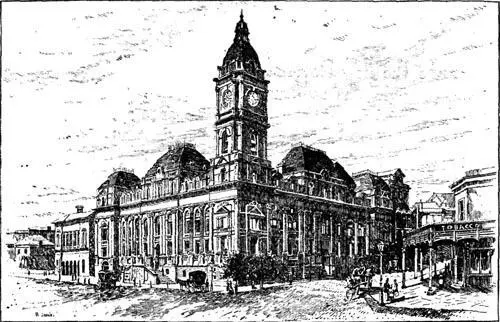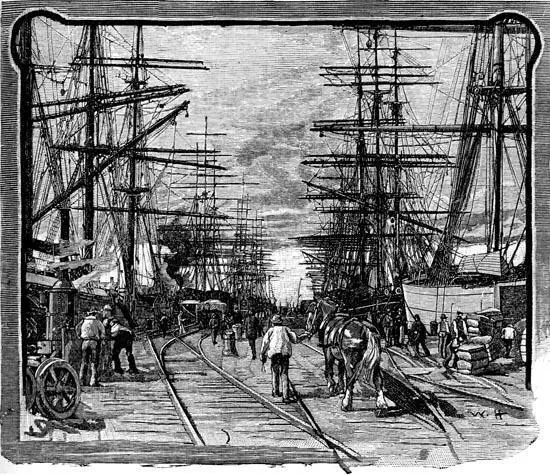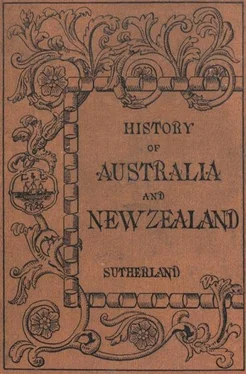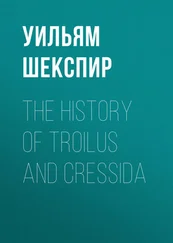MʻCulloch tried to persuade them to pass it, but they were obstinate. He then resorted to a trick which is in itself objectionable, but which is perhaps excusable when the great body of the people wish a certain thing and a small body like the Legislative Council are resolved to thwart them. It is part of our constitutional law that all bills dealing with money matters must be prepared in the Lower House; the Upper House can then accept them or reject them as they stand, but is not allowed to alter them.
Now, once a year Parliament has to pass a bill called the Appropriation Act, by which authority is given to the Government to spend the public money in the various ways that Parliament directs. In 1865 MʻCulloch put the whole of the Protective Tariff Bill into the Appropriation Act as if it were a part of that Act, though really it had nothing to do with it. The Legislative Assembly passed the Appropriation Act with this insertion. The Legislative Council now found itself in a most unlucky position. If it passed the Appropriation Act it would also pass the Protective Tariff Bill, which it detested. But if it rejected the Appropriation Act, then the Government would have no authority to pay away any money, and so all the officers of the State, the civil servants and the policemen, the teachers, the gaolers, the surveyors and the tide-waiters, would all have to go on for a year without any salaries. There was no middle course open, for the Council could not alter the Appropriation Act and then pass it.
Whether was it to pass the Act and make the protective tariff the law of the land; or reject it, and run the risk of making a number of innocent people starve? It chose the latter alternative, and threw out the bill. The whole country became immensely excited, and seemed like one debating club, where men argued warmly either for or against the Council.
Matters were becoming serious, when the Ministry discovered an ingenious device for obtaining money. According to British law, if a man is unable to obtain from the Government what it owes him, he sues for it in the Supreme Court; and then, if this Court decides in his favour, it orders the money to be paid, quite independently of any Appropriation Act, out of the sums that may be lying in the Treasury. In their emergency, the Ministry applied to the banks for a loan of money; five of them refused, but the sixth agreed to lend forty thousand pounds. With this the Government servants were paid, and then the bank demanded its money from the Government; but the Government had no authority from Parliament to pay any money, and could not legally pay it. The bank then brought its action at law. The Supreme Court gave its order, and the money was paid to the bank out of the Treasury. Thus a means had been discovered of obtaining all the money that was required without asking the consent of Parliament. Throughout the year 1865 the salaries of officers were obtained in this way; but in 1866 the Upper House, seeing that it was being beaten, offered to hold a conference. Each House made concessions to the other, the Tariff Bill was passed, with some alterations, the Appropriation Bill was then agreed to in the ordinary way, and the “Deadlock” came to an end.
3. The Darling Grant.—But, in its train, other troubles followed; for the English authorities were displeased with Sir Charles Darling for allowing the Government to act as it did. They showed how he might have prevented it, and, to mark their dissatisfaction, they recalled him in 1866. He bitterly complained of this harsh treatment; and the Assembly, regarding him as, in some measure, a martyr to the cause of the people, determined to recompense him for his loss of salary. In the Appropriation Act of 1867 they therefore passed a grant of £20,000 to Lady Darling, intending it for the use of her husband. The Upper House owed no debt of gratitude to Sir Charles, and, accordingly, it once more threw out the Appropriation Bill. Again there was the same bitter dispute, and again the public creditors were obliged to sue for their money in the Supreme Court. In a short time four thousand five hundred such pretended actions were laid, the Government making no defence, and the order being given in each case that the money should be paid.
In 1866 the new Governor—Viscount Canterbury—arrived; but the struggle was still continued, till, in 1868, Sir Charles Darling informed MʻCulloch that Lady Darling would decline to receive the money, as he was receiving instead five thousand pounds as arrears of salary and a lucrative position in England. The Upper House then passed the Appropriation Bill, and the contest came to an end.
4. Payment of Members.—But they had other things to quarrel about. The working men of the colony thought that they never would get fair treatment in regard to the laws until working men were themselves in Parliament. But that could not be, so long as they had to leave their trades and spend their time in making laws while getting nothing for it. Hence they were resolved on having all members of Parliament paid, and they elected persons to the Lower House who were in favour of that principle. But the better-off people sent persons into the Upper House who were against it. Thus for twenty years a struggle took place, but in the end the working men carried their point; and it was settled that every member of Parliament should receive three hundred pounds a year. The two Houses also quarrelled about the manner in which the land was to be sold; the Lower House being anxious to put it into the hands of industrious people who were likely to work on it as farmers, even though they could pay very little for it; the Upper House preferring that it should be sold to the people who offered the most money for it. On this and other questions in dispute the Lower House gained the victory.

The Town Hall, Melbourne.
5. Exhibitions.—It was not till the year 1880 that all these contentions were set at rest, but from that time the colony passed into a period of peace, during which it made the most astonishing progress in all directions. That progress was indicated in a most decided way by the exhibitions held in the colony. It had from time to time in previous years held inter-colonial exhibitions at which all the colonies had met in friendly competition. But in 1880, and again in 1888, Victoria invited all the world to exhibit their products at her show. A magnificent building was erected in one of the parks of Melbourne, and behind it were placed acres of temporary wooden erections, and the whole was filled with twenty acres of exhibits. A similar show, held in 1888, was much larger, and helped, by its fine collection of pictures, its grand displays of machinery, its educational courts, its fine orchestral music, and so on, in a hundred ways to stimulate and develop the minds of the people. During recent years Victoria has been very busy in social legislation. While enjoying peace under the direction of a coalition Government with Mr. Duncan Gillies and Mr. Alfred Deakin at its head, the colony has tried experiments in regulating the liquor traffic; in closing shops at an early hour; in irrigating the waterless plains of the north-west, and in educating farmers and others into the most approved methods of managing their businesses. What is to be the eventual result no one can as yet very definitely prophesy. But the eyes of many thoughtful persons throughout the world are at present turned to Victoria to see how those schemes are working which have been so zealously undertaken for the good of the people.

The Port of Melbourne.
Up till 1890 the progress of the colony was astonishing. Its central half forms a network of railways. Its agriculture and its trades have doubled themselves every few years; and though a period of restless activity and progress was in 1890 followed by a time of severe depression, the community, like all the other Australian colonies, has great times of prosperity in store for it.
Читать дальше














